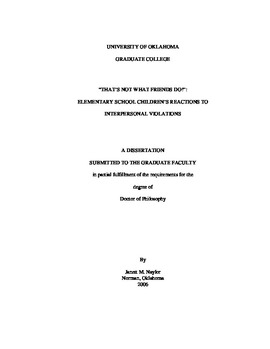| dc.contributor.advisor | Murphy, Bridget C., | en_US |
| dc.contributor.author | Naylor, Janett M. | en_US |
| dc.date.accessioned | 2013-08-16T12:20:04Z | |
| dc.date.available | 2013-08-16T12:20:04Z | |
| dc.date.issued | 2006 | en_US |
| dc.identifier.uri | https://hdl.handle.net/11244/997 | |
| dc.description.abstract | Little is known about how children respond to interpersonal violations by best friends; therefore the goal of the present study was to examine children's reactions to violations in detail. When confronted with problematic interactions, children must immediately assess the situation and determine the short-term impact, as well as the long-term impact on the relationship. Specifically, children must justify their friends' actions, determine their willingness to overcome, and assess the long-term negative impact on the friendship. Elementary school children (N=105) responded to six hypothetical vignettes depicting interpersonal violations (e.g., lie, blame, and secret) and completed measures of social cognitive skills. Results indicate that children's short-term assessment (occurrence of forgiveness, occurrence of revenge, and reasonings about overcoming) does impact their expectations of long-term negative impact. In addition, friendship understanding and emotional display rules were significantly related to several aspects of children's reactions. Overall, children select behaviors and reason to reduce the negative aspects following interpersonal violations. Moreover, children view the use of forgiveness as positive and the use of revenge as negative. Findings indicate that children's reactions to interpersonal violations is a worthy and vital area of research that needs more examination. | en_US |
| dc.format.extent | viii, 104 leaves ; | en_US |
| dc.subject | Friendship in children. | en_US |
| dc.subject | Psychology, Social. | en_US |
| dc.subject | Violence in children. | en_US |
| dc.subject | Interpersonal relations in children. | en_US |
| dc.subject | Psychology, Developmental. | en_US |
| dc.title | "That's not what friends do!": Elementary school children's reactions to interpersonal violations. | en_US |
| dc.type | Thesis | en_US |
| dc.thesis.degree | Ph.D. | en_US |
| dc.thesis.degreeDiscipline | Department of Psychology | en_US |
| dc.note | Source: Dissertation Abstracts International, Volume: 67-02, Section: B, page: 1183. | en_US |
| dc.note | Adviser: Bridget C. Murphy. | en_US |
| ou.identifier | (UMI)AAI3207536 | en_US |
| ou.group | College of Arts and Sciences::Department of Psychology | |
